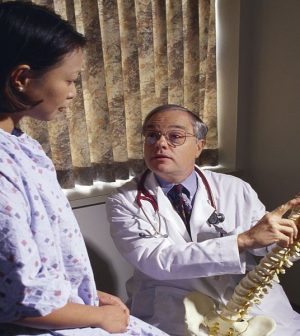- Could Your Grocery Store Meat Be Causing Recurring UTIs?
- Are You Making This Expensive Thermostat Error This Winter?
- Recognizing the Signs of Hypothyroidism
- 10 Strategies to Overcome Insomnia
- Could Artificial Sweeteners Be Aging the Brain Faster?
- Techniques for Soothing Your Nervous System
- Does the Water in Your House Smell Funny? Here’s Why
- Can a Daily Dose of Apple Cider Vinegar Actually Aid Weight Loss?
- 6 Health Beverages That Can Actually Spike Your Blood Sugar
- Treatment Options for Social Anxiety Disorder
What’s the Right Age to Test for Osteoporosis?

Osteoporosis is a threat to many women, especially after menopause. But the lead up to weak, brittle bones can start much earlier in life.
When bone density drops but isn’t yet at the level of osteoporosis, it’s called osteopenia. Osteopenia affects more than 33 million Americans over age 50, men and women, while 10 million have osteoporosis.
Yet the DEXA scan, the painless X-ray-based test that measures bone density, isn’t recommended for women until age 65, when they may need bone-building drugs to avoid fractures. For men, the prevalence of osteoporosis doesn’t increase with age until 80, but even then, there are no screening guidelines. So, what’s the answer?
Cost versus benefit is one reason insurers don’t universally cover the scan for women under 65. But you may be a candidate for earlier testing if you broke a bone after age 45, are losing height, are developing a slumped or hunched posture, or have sudden, unexplained back pain.
If you’re healthy but have concerns about bone health or risk factors for osteoporosis, you can talk to your doctor about earlier testing.
Factors that can increase your fracture risk include your height and weight — very thin women are at greater risk. Not getting enough exercise, smoking, drinking alcohol, a family history of osteoporosis or having a parent who broke a hip are others. Having a disease or taking medications associated with an increased risk of osteoporosis also increases your risk of fractures.
For better bone health, make sure your diet includes good sources of calcium-rich foods, that you get enough vitamin D through sunlight or a supplement, and that you get regular, weight-bearing exercise. That includes activities done while standing, like walking, which helps develop bone. Limit alcohol to one drink a day and don’t smoke.
More information
Harvard Health has more on osteopenia and osteoporosis.
Source: HealthDay
Copyright © 2026 HealthDay. All rights reserved.










